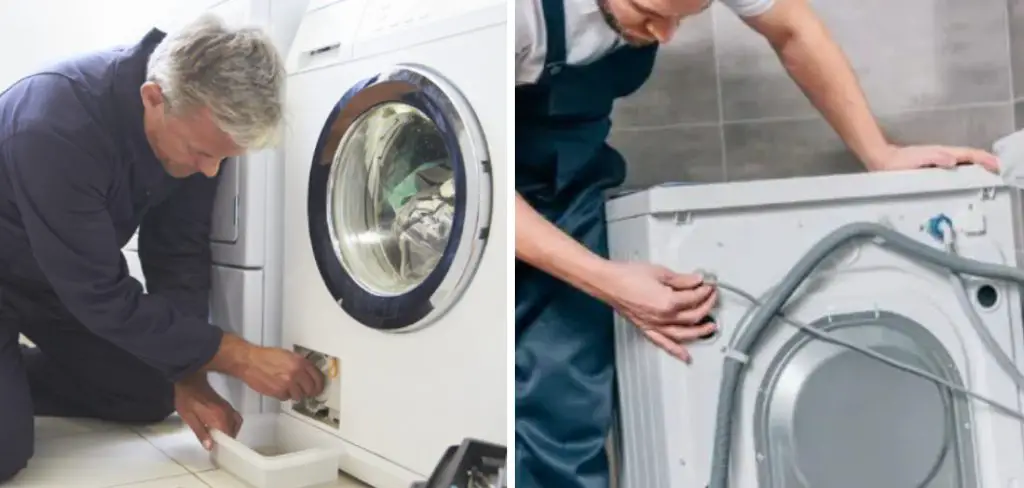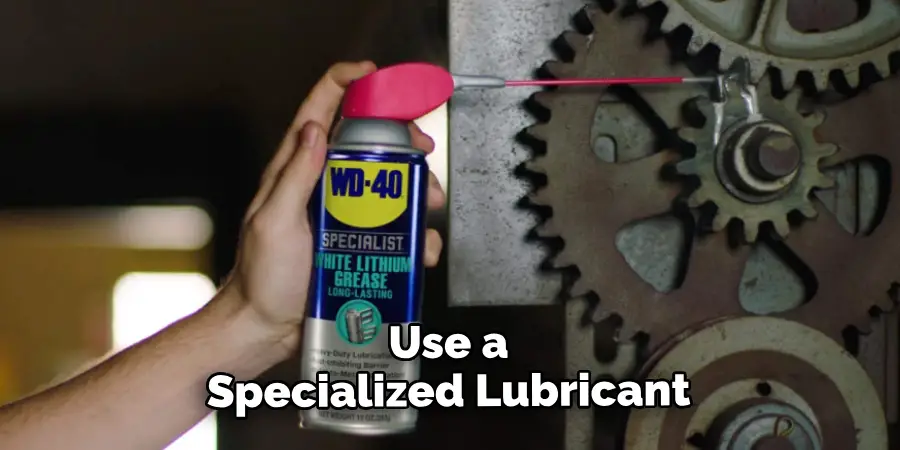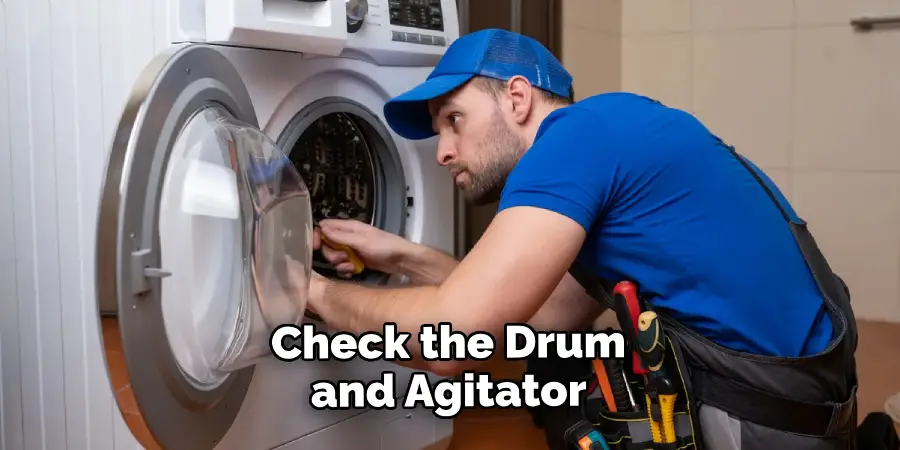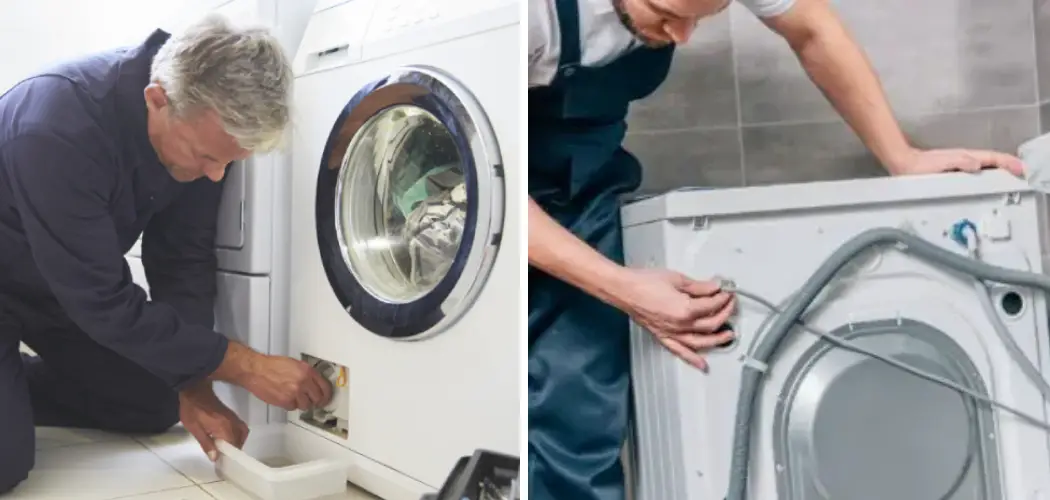A noisy washing machine can be quite annoying and disruptive, not to mention it could be a sign of a larger problem. Ignoring a loud washing machine can lead to further damage and may even result in needing to replace the entire appliance. By learning to fix a noisy washing machine, you can save yourself time, money, and frustration in the long run.

There are several advantages of fixing a noisy washing machine. First and foremost, it can save you money. By being able to troubleshoot and fix the issue yourself, you won’t have to hire a professional repair service, which can be costly. Read this blog post to learn how to fix a noisy washing machine.
Step-by-step Instructions for How to Fix a Noisy Washing Machine
Step 1: Inspect the machine
Take a close look at the washing machine and try to identify where the noise is coming from. One common reason for a noisy washing machine is loose items inside the drum. Make sure to check all pockets before doing a load of laundry to prevent this issue.
Step 2: Level the Machine
Check that the machine is sitting on a level surface. Use a leveling tool to ensure that all four corners are evenly placed on the ground. If your washing machine isn’t level, you can adjust the feet to make it so. Loosen the lock nut on each foot and turn it clockwise or counterclockwise until the machine is level.
Step 3: Tighten Any Loose Parts
If there are any loose screws or bolts, tighten them with a screwdriver or wrench. Loose parts can cause vibrations and noise during the wash cycle. Sometimes small items like coins or buttons can get caught in the drum and cause a rattling noise. Use a flashlight to inspect the inside of the drum and remove any debris.
Step 4: Examine the Pump
The pump is responsible for draining water out of the machine, and if it’s damaged, it can cause loud noises. Check for any clogs or damage and replace the pump if necessary. The motor is another potential source of noise in a washing machine. Make sure it’s running smoothly and doesn’t have any loose or broken parts.
Step 5: Lubricate Moving Parts
If you hear squeaking or grinding noises, it could be due to lack of lubrication on moving parts. Use a specialized lubricant or Vaseline to reduce friction and quiet the machine. Belts can become worn over time, causing them to slip or make noise. Inspect all belts and replace any that are damaged or frayed.

Step 6: Consider Replacing Bearings
If you hear a loud banging noise during the wash cycle, it could be because the bearings have worn out. Replacing them can help eliminate the noise and prevent further damage to the machine. If you’ve tried all of these steps and your washing machine is still making excessive noise, it may be time to call in a professional. They can diagnose the issue and make any necessary repairs or replacements.
Remember, it’s always best to consult a professional if you’re not comfortable working on your washing machine yourself.
Safety Tips for How to Fix a Noisy Washing Machine
- Unplug the washing machine before starting any repair work to avoid electric shocks.
- Wear protective gear, such as gloves and safety glasses, to prevent injuries while handling sharp or heavy objects.
- Keep children and pets away from the washing machine during repairs.
- Read the manufacturer’s manual thoroughly to understand the inner workings of your specific model before attempting any repairs.
- Do not attempt to fix any electrical or mechanical issues if you are not familiar with washing machine repair. Seek professional help instead.
- Use a sturdy and stable platform, such as a workbench or table, to place the washing machine on during repairs.
- Always double check that all parts are properly installed and secured before turning on the washing machine again.

Now that you have some safety tips in mind, here are some general steps to help you fix a noisy washing machine.
Common Causes for a Noisy Washing Machine
1. Unbalanced Load
An unbalanced load is one of the most common causes of a noisy washing machine. This happens when the items in the machine are not distributed evenly and cause the machine to shake and rattle during its cycles.
2. Loose Motor Mounts or Shock Absorbers
Another potential cause of a noisy washing machine is loose motor mounts or shock absorbers. These can become worn out over time and cause the machine to vibrate excessively.
3. Worn Out Drum Bearing
The drum bearing is responsible for supporting the weight of the washing machine drum. Over time, this bearing can wear out and cause a loud banging noise during spin cycles.
4. Damaged Drive Pulley
A damaged drive pulley, located at the bottom of the washing machine, can also contribute to a noisy machine. This pulley helps to turn the drum and if it becomes damaged, it can cause loud noises during operation.
5. Faulty Water Inlet Valve
If you notice a humming or buzzing noise coming from your washing machine, it could be due to a faulty water inlet valve. This valve controls the flow of water into the machine and if it is damaged, it can cause a loud noise.
Are There Any Visible Signs of Damage That Could Explain the Noise?
When trying to fix a noisy washing machine, it’s important to first inspect the machine for any visible signs of damage. This could include cracks or breaks in the outer casing, loose screws or bolts, or damaged components inside the machine. If you notice any of these signs, it could be the cause of the noise and will need to be fixed before attempting any other solutions. If you’re unsure how to fix the damage, it’s best to consult a professional for assistance.
In addition, check the drum and agitator (if applicable) for any objects that may have become stuck or caught. This can also cause excess noise during operation and should be removed if found. By identifying and fixing any visible signs of damage, you may be able to solve the noise issue without further troubleshooting.

Maintenance Tips After Fixing a Noisy Washing Machine
After successfully fixing a noisy washing machine, it is important to properly maintain it to ensure its longevity and prevent any future issues. Here are some tips on how to maintain your washing machine after fixing the noise issue:
1. Regular Cleaning
It is important to clean your washing machine periodically, even if it doesn’t have any visible dirt or debris. This will help in preventing any build-up of dirt or detergent residue that can affect its functioning and cause noise.
2. Check the Level
Make sure your washing machine is levelled properly to avoid excessive vibration and noise during use. You can use a leveling tool or simply adjust the feet of the machine until it is perfectly balanced.
3. Inspect for Loose Parts
After fixing the initial noise issue, make sure to regularly inspect your washing machine for any loose parts. Worn out belts or screws that have loosened can cause noise and should be replaced or tightened as needed.
4. Use the Right Detergent
Using too much detergent or not using the right type of detergent can also cause excessive noise in a washing machine. Always follow the manufacturer’s instructions for the right amount and type of detergent to use.
5. Don’t Overload
Avoid overloading your washing machine as it can put unnecessary strain on its moving parts and cause noise. Follow the recommended weight limit for each load and distribute clothes evenly in the drum.
6. Replace Worn Out Parts
Over time, certain parts of your washing machine may wear out and need to be replaced. Keep an eye out for any signs of wear and tear, such as frayed belts or damaged bearings, and replace them promptly to avoid further noise issues.
7. Regular Maintenance
Lastly, schedule regular maintenance checks for your washing machine to ensure that all its parts are functioning properly. This can help identify any potential issues early on and prevent them from turning into major problems.

By following these simple maintenance tips, you can keep your washing machine running smoothly and quietly for years to come. Remember, prevention is always better than cure when it comes to appliances, so don’t neglect the upkeep of your newly fixed washing machine.
Conclusion
In conclusion, knowing to fix a noisy washing machine can save you time and money while also ensuring that your laundry day goes smoothly. However, it is important to note that fixing a noisy washing machine can be dangerous if proper precautions are not taken. Additionally, some repairs may require the expertise of a professional, which could result in additional costs.
Moreover, fixing a noisy washing machine can also be time-consuming and frustrating, especially if you encounter unforeseen complications along the way. Additionally, it may require specialized tools that are not readily available, resulting in additional expenses. I hope this article has been beneficial for learning how to fix a noisy washing machine. Make Sure the precautionary measures are followed chronologically.
Rick is a handyman who grew up helping his dad with his business. He learned a lot from him about how to fix things, and also about how to work hard and take care of business. These days, Rick is still into fixing things- only now, he’s doing it for a living.
Rick is always looking for new ways to help people grow and develop. That’s why he started contributing to this blog: to share all his experience and knowledge so that he can help people who are interested in DIY repair.

